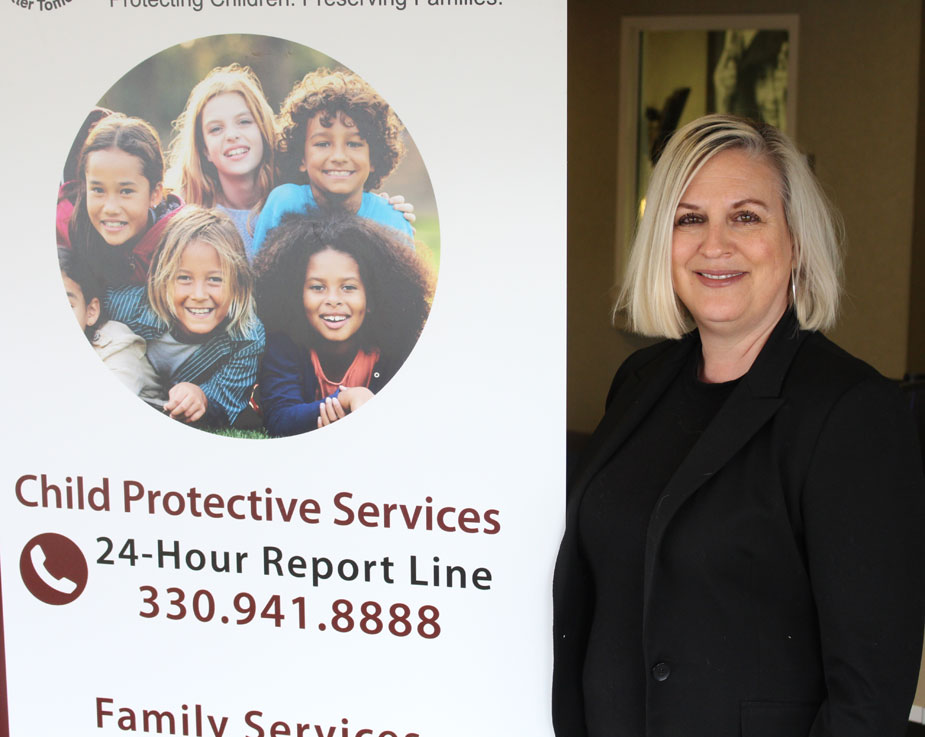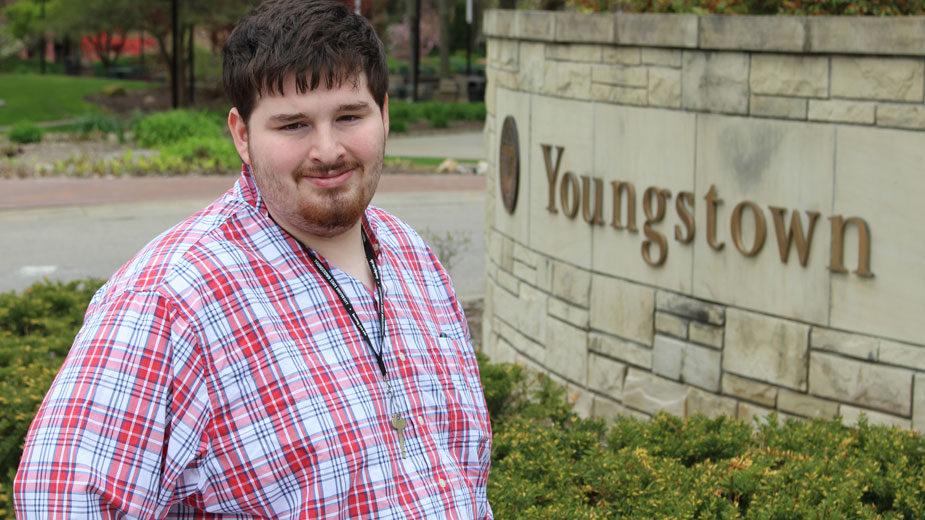By Amanda Joerndt
YOUNGSTOWN, Ohio — As Josh Drohn approached his 18th birthday, the reality of surviving on his own outside the foster care system was frightening.
“I’m not going to lie,” Drohn says. “After I turned 18 and I had nowhere to go; I thought I would be on the streets.”
Drohn had lived with his mother 10 years and was moved around five more until he was placed in the foster system, he says. “It was always just me,” he says. “I just had fears, like, ‘Am I going to make it out?’ ”
A month before Drohn turned 18, he was introduced to the Bridges program through the Ohio Department of Job and Family Services. He jumped at the opportunity to study education at Youngstown State University. Drohn aspires to be a social studies teacher and hopes to help children in the Youngstown area who also experienced neglect and abuse. Last semester, he maintained a 3.46 grade point average.
“I have people I can trust and talk to. I have resources I can go to in case I feel stressed with test anxiety and I’ve been able to go out more than I was,” Drohn says. “I want to help kids not only succeed in school, but with their future as well.”
According to data compiled in 2014 by Foster Care to Success, a national nonprofit, half of foster care youth completed high school by 18. Of those students, 20% attend college, and 2% to 9% earn baccalaureates.
The Bridges program provides educational, employment and housing opportunities for foster kids approaching their removal, or emancipation, from the system. Since its inception in 2017, Bridges has helped more than 1,250 young Ohioans, reports the Department of Job and Family Services. ODJFS governs Bridges by a contract with the Child and Family Health Collaborative of Ohio, partnering the program with provider agencies across the state.
Typically, upon reaching 18 years of age, children in foster care are removed from the system and left with the responsibility of beginning their lives as independent adults. In 2017, Gov. John Kasich signed House Bill 50, which extended housing and case management services to eligible young adults who leave foster care on or after their 18th birthdays, but are not yet 21.
The supervisor and liaison for the Bridges program at Cadence Care Network, Jeff Orbin, says there was a need for continual foster care where children aging out were ending up incarcerated or homeless.
“There was a lot of time spent looking at how that money is invested,” he says. “And a lot of state money goes toward paying for the incarceration, mental health, homeless, drug and alcohol use.”
In an effort to break the cycle of homelessness and drug abuse, Cadence Care works with YSU and other agencies to provide the Bridges program. The organization is based in Niles and has locations in Boardman and Ashtabula.
Cadence Care has hired more employees to work with students in Bridges. With 45 students in the program, it’s “one of the largest in the northeastern Ohio area,” Orbin says. Youths going through the program are taught self-discipline and independence, and to invest in their futures and long-term goals.
“We’re trying to teach them that ‘You’re an adult now. You’re independent.’ And we’re here for them; but they have to do things for themselves as well,” Orbin says.
For foster kids right out of high school, Cadence Care has three years to help those who want to go to college, enter a trade program or join the workforces. In exchange for providing monthly evidence of eligibility and that the program is meeting their needs, students receive a stipend from the state to pay for daily living expenses, Orbin says.
Bridges allows Cadence Care to help students “adjust to the collegiate environment.
“We’re trying to have a professional at each of the departments – financial aid, scholarships, dormitory – to help them navigate,” Orbin says. “When a student does the FAFSA form, there are a few checkmarks that ask if you are a ward or orphan of the courts. If you check that, that gives the full amount of financial aid to you.”
Cody Burke is completing his freshman year at YSU and was moved around three times before entering Bridges.
“The house wasn’t safe to live in,” Burke says. “[My siblings and I] moved around a lot during the emergency placement before they found a proper home for us.”
Burke says he was fortunate to stay with his siblings and live with his aunts until he and his siblings were removed from the subsidized house they were living in. “They wouldn’t give our aunts a bigger house and we didn’t have proper rooms to stay in,” he says. He knew he wanted to earn a college degree, and after applying for grants and scholarships, one of his social workers told him about Bridges as a way to get into college and graduate.
“I don’t know exactly where I would be. I wouldn’t be here. That’s for sure,” he says. “I don’t expect to get a job in my field immediately, but I hope to get one eventually.”
Orbin has been a mentor to Drohn and Burke during their first years at YSU.
“[Jeff Orbin] is like a second father to me,” Drohn adds. “He has been very helpful to me as well as all of the [social workers]. For some reason, I just love him and appreciate everything he’s done for me.”
Still, the experience of living in a group home haunts Drohn as a young adult, he says.
“I got beat up a lot and [the system] didn’t care. … And I just felt like, ‘I’m human. Why aren’t they?’ ” he says.
Heather Craver, clinical director at Cadence Care Network, oversees staff who provide mental health treatment for children with comprehensive or behavioral issues during or after their time in the system.
“We sometimes get referrals from Children Services. Sometimes families become involved because of abuse or neglect,” Craver says. “We start with therapy and case management at 3, but we don’t cut off when someone reaches 18.”
On average, 10% to 15% of the organization’s clients are adults, she notes. “If clients don’t meet what they call medical necessity for treatment, then we won’t provide treatment,” she says. “We look at symptom reduction and giving families the tools they need to be successful.”
Quite frequently, Orbin says, the Bridges program encounters young adults in need of mental and emotional support and refers them to Cadence Care Network services.
“One of the positives with [Cadence] is that we are also our own community mental health agency.
And with that, our Bridges liaisons have a direct pipeline to the mental health department,” he says. “Currently we have a Bridges-specific mental health clinician on staff that specializes in the unique issues that our Bridges young adults interact with on a daily basis.”
Having a dedicated in-house mental clinician benefits young adults in Bridges because it “increases the team communication and access that the young adult has to their liaison and mental health staff,” he says.

Other Children Services agencies can refer youth to Cadence for Bridges as well. Mahoning County Children Services refers children to Bridges for employment and education opportunities, says its spokeswoman, Jennifer Kollar. Children Services works on cases that illustrate neglect, abuse and dependency in their homes. Childhood experiences have the potential to hinder someone’s future, she says, so the agency works with children from a young age to get them equipped for their emancipation from the foster care system.
“The type of trauma a child has been exposed to may have left or may lead, in the future, to physical, cognitive and developmental delays that may have an effect on the child’s educational and learning abilities,” Kollar says. “Kids age 14 to 18 who are in foster care – we start working to become strong in their skills so if they do emancipate at age 18 out of foster care, they have a good working knowledge of how to find a job or if they want to go to school.”
Cadence’s network helps find those opportunities for kids to work in the Bridges program. Mina’s Foster Closet, a North Lima-based nonprofit, offers volunteer opportunities for Bridges students.
“[Young adults] started volunteering with me and spending a lot of time at the foster closet,” says Nicole Tsarnas, owner of Mina’s. “It’s very cool to see them giving back to a system that they already came out of.”
Tsarnas is a licensed foster parent in Mahoning County and is currently fostering two children younger than 2 along with raising three biological children. Mina’s also serves children emancipating out of the system by providing needed new or gently used goods to foster parents and kinship guardians.
“We provide them with food and things for their first apartment, clothes, shoes, some of the smaller things that we provide for all of our kids. But we also help them with items for their first place,” Tsarnas says.
Pictured at top: The Bridges program helped Josh Drohn attend Youngstown State University, where he studied education and maintains a 3.46 grade point average.
